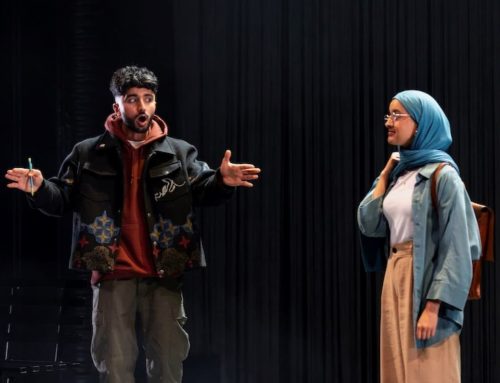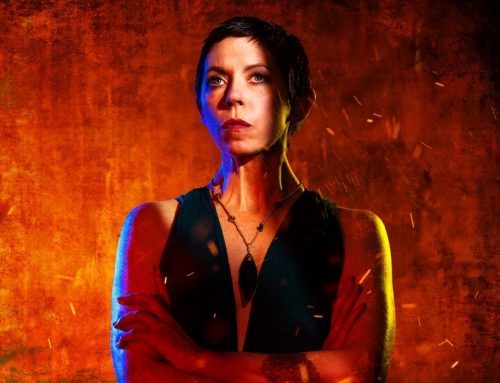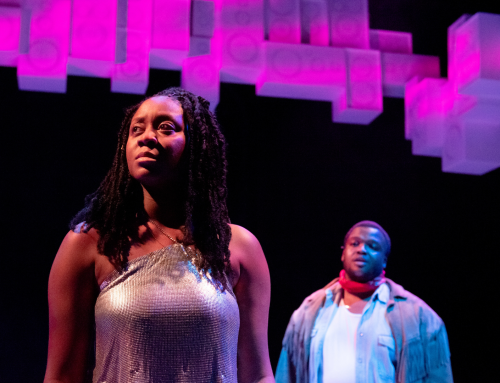Although the narrative does not always persuade, Zodwa Nyoni’s saga of a struggling family has skilled writing and two fantastic performances.
21 July 2022 – Press Night
If there is a pattern emerging in Zodwa Nyoni’s rapidly expanding repertoire of quality work, it is in her desire to give a voice to people previously unlistened to and unheard.
“Use your words” is the injunction that Dwight, the severely autistic protagonist of the Kiln’s The Darkest Part of The Night hears constantly from mother Josephine, father Leroy, and sister Shirley. It is almost as if the writer is simultaneously willing her central character to speak and offering him the means to do so. One gets the feeling there is something deeply personal, perhaps autobiographical about Nyoni’s intentions here.
The words Dwight is given are the jarred, repetitive, and sparing expressions of severe autism. Sometimes they are transmitted through the character’s infatuation with the lyrics of Jamaican pop. They can be difficult for the audience to interpret, but they provide a skilled and manifestly affecting insight into a dysfunctional mind.
The evolving relationships between Josephine and Leroy, archetypal Windrush generation parents, and between their mismatched but loving children form the central and most interesting narrative arc of this ambitious play.
Although the play begins, ends, and periodically jumps back into the present day, most of the action takes place in early 80s Leeds. Designer Kean Chan gets the period tone of a modest but well-kept Chapeltown terrace just right – Drinks trolley with Mountgay rum, vinyl tablecloth over mum’s best lace, dilapidated leather furniture, boom-box speakers, and pride of place, a vast family record-player on which much of the action unfolds.
Precocious 13-year-old Shirley is doing well at school, although much of her time is spent defending 11-year-old Dwight from the twin threats of school bullies and uncaring teachers. Shirley is the best sister she can be to Dwight, but sometimes, as the pre-interval twist reveals, one’s best just is not good enough.
Nobody quite knows what is wrong with Dwight, but hard-working nurse mum and redundant factor-worker dad rail against a system that has labelled their son ‘retarded’. Their fight to keep him out of a ‘special’ school is not helped by racist headmaster Mr Campbell (James Clyde) who seems to have already written the boy off.
An unfortunate incident in a local Woolworth’s sees naïve and struggling white social worker Anna (Hannah Morrish) question the couple’s parenting skills.
Things get worse when Dwight inexplicably elopes from a visit to a local aunt and falls into the hands of the uncomprehending and deeply unsympathetic police. The boy is swiftly despatched to a local psychiatric hospital and the family face a frantic struggle to get him home, a fight not helped by Leroy’s arrest at a local demonstration against endemic police racism.
Brianna Douglas’ remarkable performance as both 1980s Josephine and present-day Shirley is nuanced, powerful and touching.
Andrew French’s turn as a brooding and conflicted Leroy, juggling obligations to family with an emerging role as a fighter for racial justice, is tremendous. French has less to do as modern-day Shirley’s husband Calvin, perhaps because there is some inherent ambiguity in Nyoni’s choice to have the same actors in twin roles.
This play works best as a personal story of challenge and redemption and less well as a political examination of 1980s Leeds. Leroy’s political awakening adds some interesting context, and the message that the fight for freedom at a large scale can entail family sacrifices is well made. But this narrative strand emerges out of nowhere and never really feels embedded in the central storyline.
The ending will not convince everyone. Nyoni has an interesting point to make about how finally getting the right medical diagnosis from the medical establishment can be a life-enhancing experience. But I wonder whether there is not a little wishful thinking in Dwight’s journey through the narrative. It is as if, having given her protagonist a voice, the writer ends up having him say what she wants to hear.
Not everything comes together in The Darkest Part of The Night, but it is certainly worth a watch.
James Clyde MR CAMPBELL/POLICE OFFICER/PRISON OFFICER/MOURNER
Brianna Douglas YOUNG SHIRLEY
Andrew French CALVIN/LEROY
Hannah Morrish ANNA/MOURNER
Lee Phillips DWIGHT
Nadia Williams SHIRLEY/JOSEPHINE
Writer Zodwa Nyoni
Director Nancy Medina
Designer Kean Chan
Duration: 2 hours 20 minutes. One interval.
Full Disclosure: I paid full box-office price for the ticket.
More Recent Reviews
Playfight. Soho Theatre.
Writer Julia Grogan’s breathtakingly assured debut play arrives at Soho Theatre following stellar reviews at the Edinburgh Fringe and [...]
All The Happy Things. Soho Theatre.
Naomi Denny’s three-hander comedy-drama All The Happy Things covers familiar themes within a recognisable premise. A grieving protagonist comes [...]
Telly. Bread and Roses Theatre.
The challenge with absurdist comedy is that many people do not find it funny. Laughing at the sheer weirdness [...]





